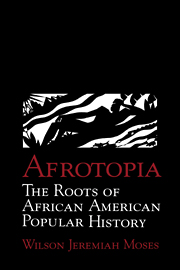Book contents
- Frontmatter
- Contents
- Acknowledgments
- Dedication
- 1 Introduction
- 2 Varieties of Black Historicism
- 3 From Superman to Man
- 4 Progress, Providence, and Civilizationism
- 5 W. E. B. Du Bois and Antimodernism
- 6 Afrocentrism, Cosmopolitanism, and Cultural Literacy in the American Negro Academy
- 7 Caliban's Utopia
- 8 Barbarism Grafted onto Decadence
- 9 Conclusion
- Notes
- Index
1 - Introduction
Published online by Cambridge University Press: 10 November 2009
- Frontmatter
- Contents
- Acknowledgments
- Dedication
- 1 Introduction
- 2 Varieties of Black Historicism
- 3 From Superman to Man
- 4 Progress, Providence, and Civilizationism
- 5 W. E. B. Du Bois and Antimodernism
- 6 Afrocentrism, Cosmopolitanism, and Cultural Literacy in the American Negro Academy
- 7 Caliban's Utopia
- 8 Barbarism Grafted onto Decadence
- 9 Conclusion
- Notes
- Index
Summary
This book is concerned with historiographies of progress and decline that have surfaced in African American consciousness – both learned and popular – from the end of the eighteenth to the middle of the twentieth century. The various perspectives on black history under discussion include one that laments the eclipse of a noble past, and one that celebrates a progressive evolution toward a new and brighter day. I have not confined myself to a definition of history as it is practiced by contemporary professional historians, but have reflected broadly on the historical understanding of literate persons outside the academy. These essays are not confined to the investigation of Afrocentrism, although I have referred throughout to the nineteenth-century origins of some of the historical views that are commonly, and misleadingly, designated “Afrocentric.” I have also alluded to African American folk histories that extend beyond simple Afrocentrism to encompass a broader Afro-Asiatic consciousness, for example, the traditions of the Moorish Science Temple and the Nation of Islam.
I must confess that I do not share the obsession with ancient Egypt, “Egyptocentrism,” that has dominated much discussion of African American folk-historiography in recent years. That is because my concern encompasses something broader and more complex than the simple attempt to explain or defend the idea that Egypt is geographically and culturally part of Africa.
Information
- Type
- Chapter
- Information
- AfrotopiaThe Roots of African American Popular History, pp. 1 - 17Publisher: Cambridge University PressPrint publication year: 1998
